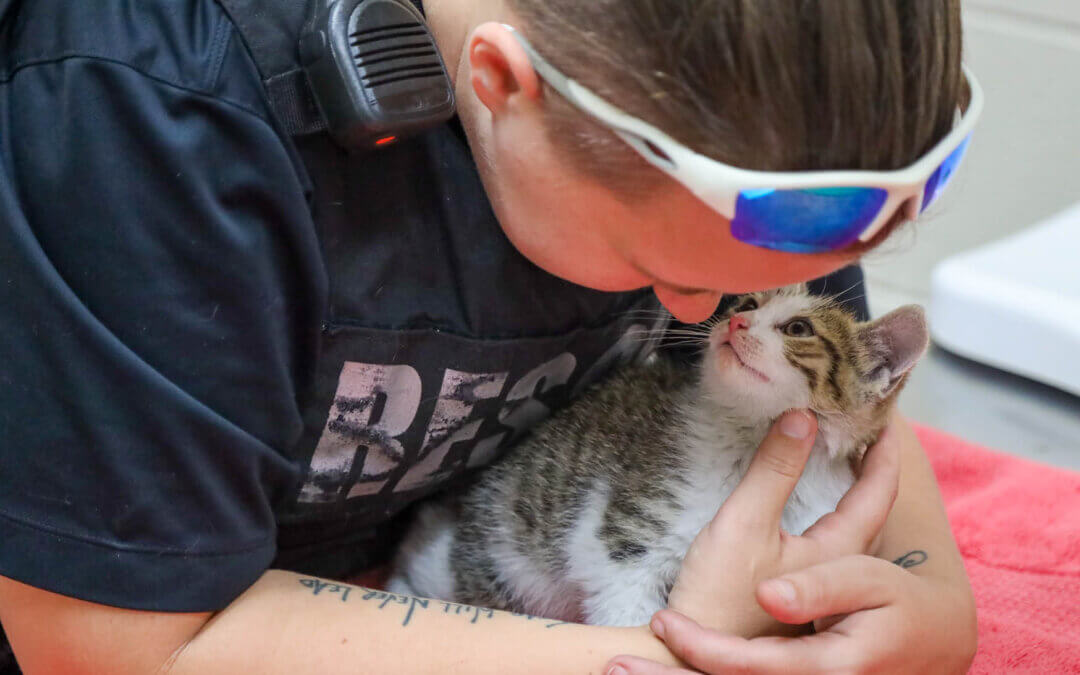Abusers in domestic violence situations use many tactics to gain or retain power and control over their victims. If the human victim has pets, one of the control tactics abusers use is to threaten or harm those pets. Studies show that domestic violence victims will often remain in an abusive relationship for fear of what will happen to their pets if they seek help. Their fear is well founded, as one study showed that 89% of abused women reported that their abuser threatened, abused, or killed their companion animals.
Michigan Humane has partnered with Attorney General Dana Nessel to investigate and prosecute animal abuse. Shortly after that partnership was announced, Michigan Humane and the Michigan Department of Attorney General worked together to investigate a case illustrating the connection between domestic violence and animal abuse. A Detroit man is alleged to have broken into his ex-girlfriend’s house to steal her dog and other items. He then sent his ex-girlfriend videos of him abusing the dog. He has been charged with a number of offenses, including killing or torturing animals in the first degree.
Michigan law has evolved in recognition of the role animal abuse plays in domestic violence, and Michigan Humane took an active role in supporting these critically important changes. In 2018, the Michigan anticruelty statute was amended to create first-, second-, and third-degree animal cruelty offenses. First- and second-degree offenses involve animal cruelty (knowingly killing, torturing, mutilating, maiming, disfiguring, or poisoning an animal) or the threat of animal cruelty to a companion animal “with the intent to cause mental suffering or distress to a person or to exert control over a person.” Penalties include up to 10 years in prison for first-degree animal cruelty and up to 7 years in prison for second-degree animal cruelty. Previously, the maximum prison sentence for animal cruelty was 4 years.
Another important development in Michigan law recognizing the connection between domestic abuse and animal cruelty happened in 2015, when Michigan became the 30th state to allow applicants for a domestic relationship personal protection order (PPO) to include their animals. A domestic relationship PPO is a court order restraining a person (the respondent) who is or was in a domestic relationship with the person applying for the PPO (the petitioner) from having certain types of contact with the petitioner. A domestic relationship PPO can protect the petitioner from threats or violence from a current or former spouse, an individual with whom he or she has had a child in common, an individual he or she has dated or is dating, or an individual residing or having resided in the same household.
Many petitioners will represent themselves and apply for a PPO without help from an attorney. There are resources available online to walk petitioners through the PPO application process. The application for a domestic relationship PPO provides a list of things the petitioner can ask the court to prohibit the respondent from doing, and the petitioner checks the box next to each one he or she would like to include. Regarding animals, the petitioner can request that the respondent be prohibited from:
- intentionally causing me mental distress or exerting control over me by:
- injuring, killing, torturing, or neglecting, or threatening to injure, kill, torture, or neglect any animal in which I have an ownership interest.
- removing any animal from my possession in which I have an ownership interest.
- retaining or obtaining possession of any animal in which I have an ownership interest.
If a respondent violates a PPO, he or she can be arrested and prosecuted for being in contempt of the court’s order. Each violation can result in the respondent being sentenced to not more than 93 days in jail and up to a $500 fine.
As of 2022, 36 states, the District of Columbia, and Puerto Rico had enacted statutes including animals in PPOs.
In addition to these changes in the law, domestic violence shelters are recognizing the need to shelter survivors’ animals in order to get the whole family to safety. Michigan Humane has a Safety Net Foster Program to provide short-term foster care for pets whose families are temporarily unable to care for them. If you know someone who could benefit from this service or if you are interested in being a Safety Net foster care provider, please contact Michigan Humane at 1-866-MHUMANE.
We are going to keep working to improve animal welfare and create a more humane community while serving as a voice for the animals through advocacy. Together, we can continue to make a difference in animals’ lives. If you know someone who you think would be interested in this information, please forward this to them and encourage them to sign up for our Legislative Action Network.
Photo Credit: Michigan Humane

